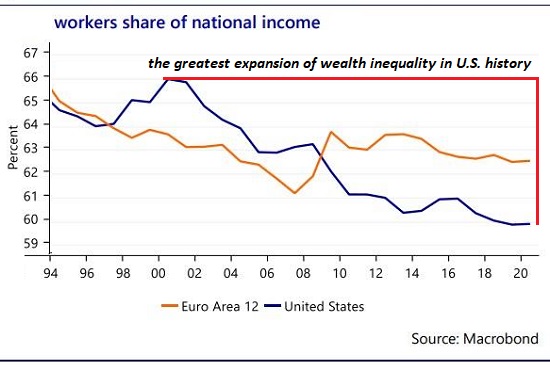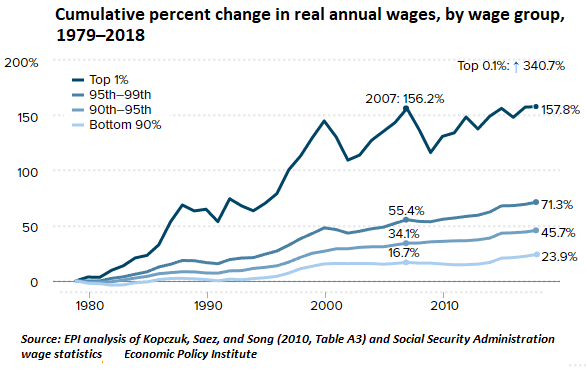Why Nations Fail
July 8, 2022
The irony is that the suppression of dissent is the suppression of
competing ideas that generate systemic stability via rapid adaptation.
Nations that appear stable may fail once they're under pressure.
What do I mean by "under pressure"? Pressure can come from many sources: invasion, civil war,
prolonged scarcities of essentials, natural disasters, financial crises, droughts, pandemics and social disorder
triggered by inequality and corruption.
Pressure diminishes the availability of resources, and exacerbates inequalities as political favoritism divides
"winners" (elites protected and enriched by state intervention) at the expense of the "losers," i.e. the commoners,
who bear the brunt of job losses, financial risks, scarcities and deprivations.
There are two dynamics in systemic pressure: forces that weaken resilience and adaptability, and forces
that strengthen adaptability. Nations fail when their status quo is focused on protecting the ruling elites
at the expense of the nation's overall adaptability to rapidly changing circumstances.
1. In ecosystems, as the entire population suffers a reduction in resources, average individual fitness declines.
This is why droughts and floods that lead to famine are typically followed by pandemics, as those with weakened
immune systems succumb to diseases which spread quickly in refugee camps, crowded cities (where starving rural
populations congregate seeking food) and towns where basic sanitation crumbles under the onslaught of reduced
tax revenues, scarcities and higher death rates.
In the developed world, even if the populace has enough food, heightened financial and other stresses lead to
burnout, breakdowns and other manifestations of social unraveling.
As average individual fitness declines, pressures mount on social, political and economic systems. If these systems
are ineffectual, brittle, sclerotic and optimized for corruption and elite incompetence, these second-order
effects of systemic pressure may be enough to push the nation into non-linear disorder. (Non-linear = small actions can trigger
large consequences in unpredictable ways.)
2. Resilient systems achieve their dynamic equilibrium (i.e. stability) from what Nobelist Ilya Prigogine
called "order through fluctuation." This is a concept that manifests in a number of fields, including
self-organization and natural selection, in which the constant flow of random mutations generates a pool
of fluctuations which enable the species or society to adapt successfully to change.
When there is relatively little pressure from environmental changes, species can remain unchanged for
tens of millions of years. The variability of mutations continues but there are few selective pressures to
favor a mutation over the existing genome.
In eras of rapid environmental change, organisms can undergo an explosion of genetic experimentation that leads
to new adaptations. This is the punctuated equilibrium model
of selective pressure and adaptation: when systemic pressure is low, there's no need for bursts of experimentation and
adaptation. But when systemic pressure soars, it's adapt or die.
We can understand variability as competition: mutations compete with the existing system's coding and the most
successful variants spread because they outcompeted existing processes.
In human political systems, this constant flow of competing variability is dissent and the competition of ideas.
Ironically, the first response of human leaders in centralized hierarchies (monarchies, totalitarian and
authoritarian regimes, theocracies, plutocracies, kleptocracies, etc.) when their nation comes under pressure
is to further consolidate power into the hands of the few and immediately suppress dissent of any kind
as a threat to the regime's power and control.
The irony is that the suppression of dissent is the suppression of
competing ideas that generate systemic stability via rapid adaptation. Stripping their
nation of dissent is in effect stripping it of the dynamics of successful adaptation and rapid evolution--
precisely the traits a nation needs to navigate eras of rapid change.
This is why so many nations and empires fail when they come under pressure: as their subsystems break down
and unravel, rather than encourage the competition of ideas and variability, i.e. dissent, they suppress dissent
as a threat to their power,
effectively dooming their nation to decay and collapse. Once the capacity to adapt and evolve has been crippled,
collapse is the only possible outcome.
These dynamics are in play globally. Many and perhaps most nation-states will fail as their elites suppress dissent
and new ideas that threaten their power but which ironically are the only means to evolve successfully to rapidly
changing circumstances.



Recent podcasts/videos:
Tectonic Shift of Mercantilism Revalued (Gordon Long, Macro-Analytics, 42 min)
My new book is now available at a 10% discount this month:
When You Can't Go On: Burnout, Reckoning and Renewal.
If you found value in this content, please join me in seeking solutions by
becoming
a $1/month patron of my work via patreon.com.
My recent books:
Global Crisis, National Renewal: A (Revolutionary) Grand Strategy for the United States
(Kindle $9.95, print $24, audiobook)
Read Chapter One for free (PDF).
A Hacker's Teleology: Sharing the Wealth of Our Shrinking Planet
(Kindle $8.95, print $20,
audiobook $17.46)
Read the first section for free (PDF).
Will You Be Richer or Poorer?: Profit, Power, and AI in a Traumatized World
(Kindle $5, print $10, audiobook)
Read the first section for free (PDF).
Pathfinding our Destiny: Preventing the Final Fall of Our Democratic Republic
($5 Kindle, $10 print, (
audiobook):
Read the first section for free (PDF).
The Adventures of the Consulting Philosopher: The Disappearance of Drake
$1.29 Kindle, $8.95 print);
read the first chapters
for free (PDF)
Money and Work Unchained $6.95 Kindle, $15 print)
Read the first section for free
Become
a $1/month patron of my work via patreon.com.
NOTE: Contributions/subscriptions are acknowledged in the order received. Your name and email remain confidential and will not be given to any other individual, company or agency.
|
Thank you, Paul E. ($54), for your marvelously generous contribution to this site -- I am greatly honored by your support and readership. |
Thank you, Pie Rre ($20), for your much-appreciated generous contribution to this site -- I am greatly honored by your support and readership. |
|
|
Thank you, Adam W. ($08), for your outrageously generous contribution to this site -- I am greatly honored by your support and readership. |
Thank you, Blaze B. ($12), for your most generous contribution to this site -- I am greatly honored by your support and readership. |

|